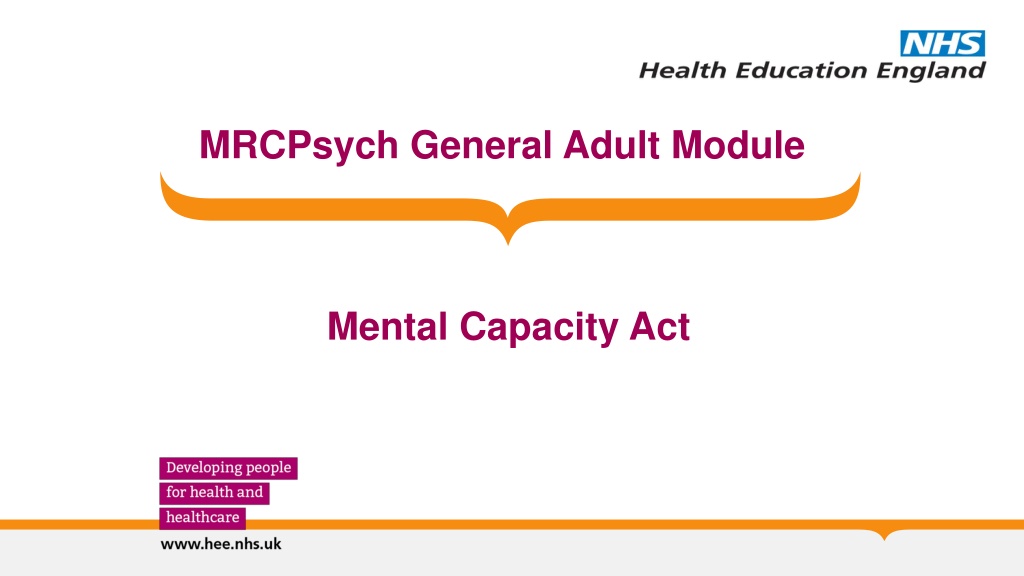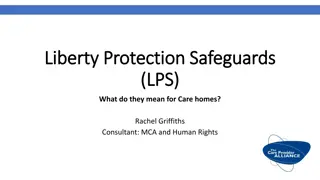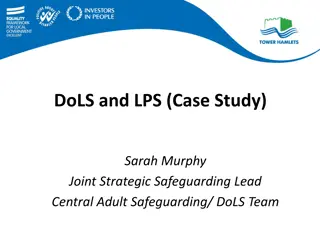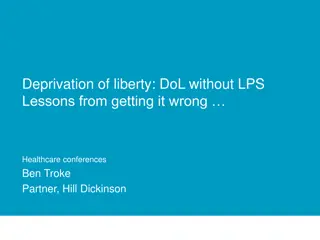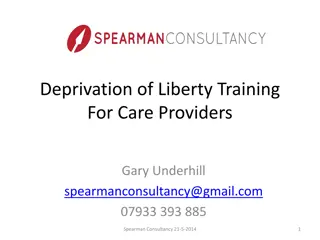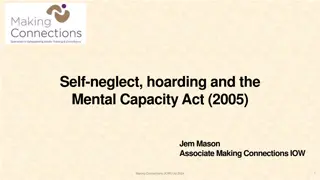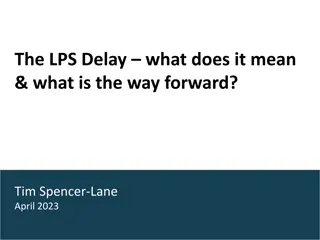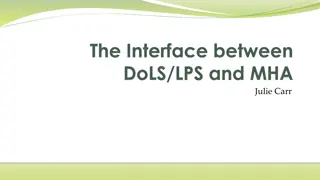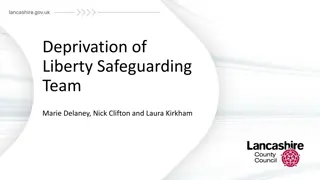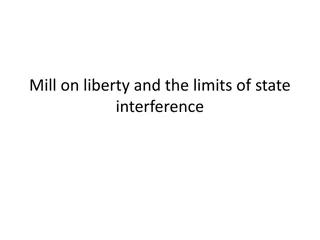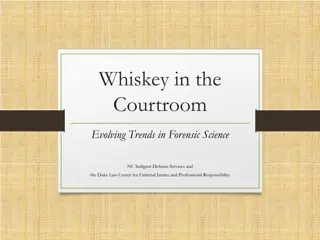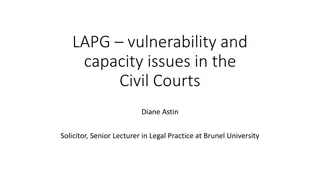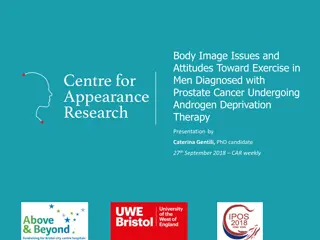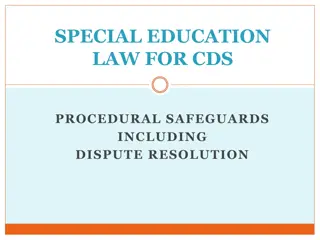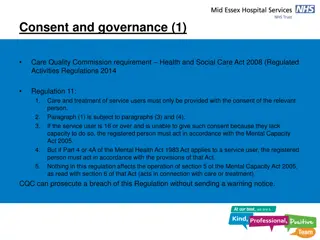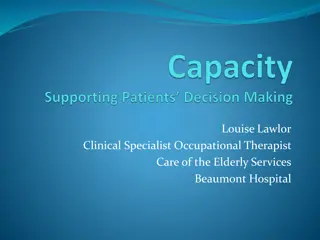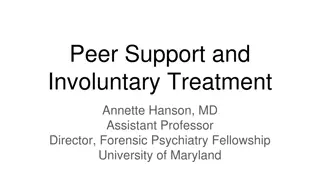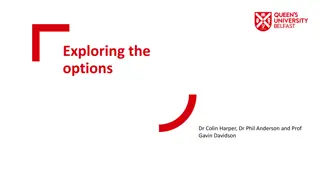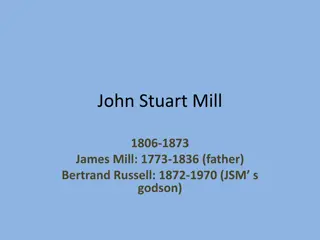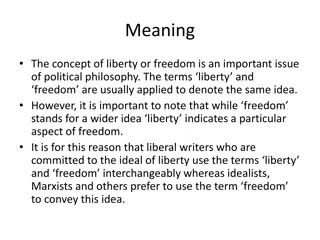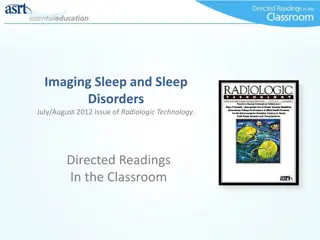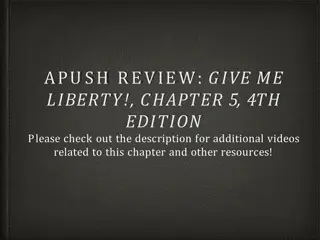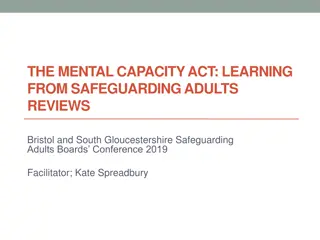Understanding Mental Capacity Act 2005 and Deprivation of Liberty Safeguards
Learn about mental capacity, the principles of the Mental Capacity Act 2005, differences between MHA and MCA, what constitutes deprivation of liberty, DoLS, the role of IMCA, important court cases, and more in this comprehensive guide. Explore the historical background, key concepts, and critical aspects of mental capacity and deprivation of liberty. Dive into expert-led sessions and discussions to enhance your understanding of this important topic.
Download Presentation

Please find below an Image/Link to download the presentation.
The content on the website is provided AS IS for your information and personal use only. It may not be sold, licensed, or shared on other websites without obtaining consent from the author. Download presentation by click this link. If you encounter any issues during the download, it is possible that the publisher has removed the file from their server.
E N D
Presentation Transcript
MRCPsych General Adult Module Mental Capacity Act
GA Module: MCA Expert Led Session General Principles of MCA 2005 & Deprivation of Liberty
Contents Background What is mental capacity and how is lack of capacity defined? The principles of Mental Capacity Act 2005 Application MHA v/s MCA What constitutes Deprivation of Liberty? Deprivation of Liberty Safeguards (DoLS) - salient points Role of IMCA Important court cases References & Further Reading Questions/ Discussion MCQs
Background 1959 Act still provides the basic framework. It replaced the judicial certification by sectioning 1983 Act emphasised patients rights to seek review of detention and right to be treated in least restrictive settings European Court of Human Rights (ECHR) was created in 1959 and was instituted which had full time judges by November 1998. 1995 Amendments supervised discharge, focus on risk management, public protection, ensuring compliance. 1998 Human Rights Act 2005 Mental Capacity Act 2007 New amendments to MHA 1983
Background The Bournewood Gap: HL v UK - Mr L who had autism and lacked capacity to consent or dissent to being in hospital. He lived with carers for 3 yrs. - He became agitated and disturbed at day centre - taken to an LD hospital (Bournewood Trust) and kept there, given higher dose of diazepam - staff were instructed to stop him from leaving - he never tried to leave hospital People who do not have the capacity to consent the Bournewood gap The ECHR held that HL should have been detained using a procedure prescribed by Law MCA and DoLS came later
What is mental capacity ? Mental capacity is the ability to make a decision: This includes the ability to make a decision that affects daily life (such as when to get up, what to wear or whether to go to the doctor when feeling ill, as well as more serious or significant decisions) It also refers to a person s ability to make a decision that may have legal consequences for them or others. Examples include agreeing to have medical treatment, buying goods or making a will [MCA CoP 4.1]
What is Lack of capacity? For the purposes of this Act, a person lacks capacity in relation to a matter if at the material time he is unable to make a decision for himself in relation to the matter because of an impairment of, or a disturbance in the functioning of, the mind or brain. This means that a person lacks capacity if: they have an impairment or disturbance (for example, a disability condition or trauma) that affects the way their mind or brain works, and the impairment or disturbance means that they are unable to make a specific decision at the time it needs to be made. [MCA CoP 4.3]
What is Lack of capacity? The impairment or disturbance does not have to be permanent. A person can lack capacity to make a decision at the time it needs to be made even if: o the loss of capacity is partial o the loss of capacity is temporary o their capacity changes over time A person may also lack capacity to make a decision about one issue but not about others [MCA CoP 4.5]
Statutory Principles of MCA 1. 2. A person must be assumed to have capacity unless it is established that he has capacity. A person is not to be treated as unable to make a decision unless all practicable steps to help him to do so have been taken without success. A person is not to be treated as unable to make a decision merely because he makes an unwise decision. An act done, or decision made, under this Act for on behalf of a person who lacks capacity must be done, or made, in his best interests. Before the act is done, or the decision is made, regard must be had to whether the purpose for which it is needed can be as effectively achieved in a way that is less restrictive of the person s rights and freedom of action. 3. 4. 5.
Assessing capacity-1 Two-stage test of capacity: 1. Does the person have an impairment of the mind or brain, or is there some sort of disturbance affecting the way their mind or brain works? (It doesn t matter whether the impairment or disturbance is temporary or permanent) 2. If so, does that impairment or disturbance mean that the person is unable to make the decision in question at the time it needs to be made? For more complex or serious decisions, is there a need for a more thorough assessment (perhaps by involving a doctor or other professional expert)? [MCA CoP Ch 4]
Assessing capacity-2 Criteria for assessing capacity: 1. Does the person have a general understanding of what decision they need to make and why they need to make it? 2. Does the person have a general understanding of the likely consequences of making, or not making, this decision? 3. Is the person able to understand, retain, use and weigh up the information relevant to this decision? 4. Can the person communicate their decision (by talking, using sign language or any other means)? Would the services of a professional (such as a speech and language therapist) be helpful? [MCA CoP Ch 4]
Application MHA v/s MCA MHA rather than MCA needs to be applied if: it is not possible to give the person the care or treatment they need without doing something that might deprive them of their liberty the person needs treatment that cannot be given under the MCA (e.g. because the person has made a valid and applicable advance decision to refuse an essential part of treatment) the person may need to be restrained in a way that is not allowed under the MCA it is not possible to assess or treat the person safely or effectively without treatment being compulsory (perhaps because the person is expected to regain capacity to consent, but might then refuse to give consent) the person lacks capacity to decide on some elements of the treatment but has capacity to refuse a vital part of it and they have done so there is some other reason why the person might not get treatment, and they or somebody else might suffer harm as a result.
What constitutes deprivation of liberty? Revised test for deprivation of liberty The Supreme Court has clarified that there is a deprivation of liberty for the purposes of Article 5 of the European Convention on Human Rights in the following circumstances: The person is under continuous supervision and control and is not free to leave, and the person lacks capacity to consent to these arrangements. The person s compliance or lack of objection, the relative normality of the placement and the purpose behind it are all irrelevant to this objective question Judgment of the Supreme Court P v Cheshire West and Chester Council and another P and Q v Surrey County Council http://supremecourt.uk/decided-cases/docs/UKSC_2012_0068_PressSummary.pdf
Deprivation of liberty - The Legal ACID Test In 2014 an important judgement was handed down in an important legal case decided in the UK Supreme Court. P v Cheshire West The acid test states that a person is deprived of their liberty if: They are subject to continuous supervision and control and Are not free to leave A person does not have to be asking to or attempting to leave to be deemed not free to leave. Care staff should ask what they would do IF the person tried or asked to leave. If the answer is that they would stop the person then the person is NOT FREE to leave within the meaning of the ACID TEST This means that if someone lacks mental capacity to consent to reside for example a residential home or hospital ward and they also meet the acid test as described above then a request for a DoLs authorisation may be required.
Deprivation of Liberty Safeguards (DoLS) Essentially it is the legal framework which allows restrictions and restraint to be used where appropriate. Extra safeguards are needed if the restrictions and restraint used will deprive a person of their liberty- the Deprivation of Liberty Safeguards (an amendment of the MCA; only applies in England and Wales) Only if deprivation is in hospital or care home (Court of Protection can be asked in other settings) Care homes or hospitals must ask either a local authority or health body if they can deprive a person of their liberty called Standard Authorisation. Six assessments to be done before Standard Authorisation can be given. Safeguards someone appointed with legal powers to represent them, Right to challenge authorizations in CoP with cost and access to IMCAs (Independent Mental Capacity Advocates)
6 requirements for standard authorization The age requirement person must be 18 or over. The mental health requirement the person must be suffering from a mental disorder within the meaning of the Act. The mental capacity requirement the person must lack capacity to make decision about the said accommodation. The best interest requirement it must be in the best interests of the person (this has 4 parts) The eligibility requirement there are 3 criteria where the person would be ineligible The absence of refusals requirement DoLs may not be applied if there is a valid advanced decision refusing some of the treatment and if his attorney or deputy has made a decision with which DoLs would be inconsistent.
Role of IMCA An Independent Mental Capacity Advocate : provides support to enable the person to participate as fully as possible in the decision obtains and evaluates the relevant information ascertains and represents the person s wishes, feelings, beliefs and values finds out about available options seeks further medical opinions if necessary [Mental Capacity- A guide to the new Law (2nd Ed.)]
Important court cases for further reading o HL vs UK - the Bournwood judgement o City of Sunderland v. PS and others the first case in which a deprivation of liberty was found and then authorized by the court. o P v Cheshire West and Chester Council and another & P and Q v Surrey County Council supreme court judgement on what constitutes deprivation of liberty.
References & further reading Mental Capacity Act 2005 Code of Practice (2007) TSO, London. Jones R (2008) Mental Capacity Act Manual (3rd Ed). Thomson Reuters, London. Greaney N, Morris F, Taylor B (2008) Mental Capacity- A guide to the new Law (2nd Ed.). The Law Society Publishing, London.
GA Module: MCA Any Questions? Thank you
GA Module: MCA MCQ 1. Which of the following statements about the MCA 2005 is FALSE: A. A person must be assumed not to have capacity unless it is established that he has capacity. B. A person is not to be treated as unable to make a decision unless all practicable steps to help him to do so have been taken without success. C. A person is not to be treated as unable to make a decision merely because he makes an unwise decision. D. An act done, or decision made, under this Act for on behalf of a person who lacks capacity must be done, or made, in his best interests. E. Before the act is done, or the decision is made, regard must be had to whether the purpose for which it is needed can be as effectively achieved in a way that is less restrictive of the person s rights and freedom of action.
GA Module: MCA MCQ 1. Which of the following statements about the MCA 2005 is FALSE: A. A person must be assumed not to have capacity unless it is established that he has capacity. B. A person is not to be treated as unable to make a decision unless all practicable steps to help him to do so have been taken without success. C. A person is not to be treated as unable to make a decision merely because he makes an unwise decision. D. An act done, or decision made, under the Act for on behalf of a person who lacks capacity must be done, or made, in his best interests. E. Before the act is done, or the decision is made, regard must be had to whether the purpose for which it is needed can be as effectively achieved in a way that is less restrictive of the person s rights and freedom of action.
GA Module: MCA MCQ 2. The Court of Protection has powers to: A. Decide whether a person has capacity to make a particular decision for themselves. B. Make declarations, decisions or orders on financial or welfare matters affecting people who lack capacity to make such decisions. C. Appoint deputies to make decisions for people lacking capacity to make those decisions D. Remove deputies or attorneys who fail to carry out their duties. E. All of the above.
GA Module: MCA MCQ 2. The Court of Protection has powers to: A. Decide whether a person has capacity to make a particular decision for themselves. B. Make declarations, decisions or orders on financial or welfare matters affecting people who lack capacity to make such decisions. C. Appoint deputies to make decisions for people lacking capacity to make those decisions D. Remove deputies or attorneys who fail to carry out their duties. E. All of the above.
GA Module: MCA MCQ 3. Section 2(1) of the MCA, 2005 defines lack of capacity as: A. For the purpose of this Act, a person lacks capacity in relation to a matter if at the material time he is unable to make a decision for himself in relation to the matter because of an impairment of, or a disturbance in the functioning of, the mind or brain. B. For the purpose of this Act, a person lacks capacity in relation to a matter if at the material time he is unable to make a decision for himself in relation to the matter because of an impairment of, or a disturbance in the functioning of, the mind or brain, except alcohol or drug use. C. For the purpose of this Act, a person lacks capacity in relation to a matter if at the material time he is unable to make a decision for himself in relation to the matter because of an impairment of, or a disturbance in the functioning of, the mind. D. For the purpose of this Act, a person lacks capacity in relation to any decision if at the material time he is unable to make a decision for himself because of any psychiatric disorder. E. For the purpose of this Act, a person lacks capacity in relation to a matter if at the material time he is unable to make a decision for himself in relation to the matter because of an impairment of, or a disturbance in the functioning of, the brain.
GA Module: MCA MCQ 3. Section 2(1) of the MCA, 2005 defines lack of capacity as: A. For the purpose of this Act, a person lacks capacity in relation to a matter if at the material time he is unable to make a decision for himself in relation to the matter because of an impairment of, or a disturbance in the functioning of, the mind or brain. B. For the purpose of this Act, a person lacks capacity in relation to a matter if at the material time he is unable to make a decision for himself in relation to the matter because of an impairment of, or a disturbance in the functioning of, the mind or brain, except alcohol or drug use. C. For the purpose of this Act, a person lacks capacity in relation to a matter if at the material time he is unable to make a decision for himself in relation to the matter because of an impairment of, or a disturbance in the functioning of, the mind. D. For the purpose of this Act, a person lacks capacity in relation to any decision if at the material time he is unable to make a decision for himself because of any psychiatric disorder. E. For the purpose of this Act, a person lacks capacity in relation to a matter if at the material time he is unable to make a decision for himself in relation to the matter because of an impairment of, or a disturbance in the functioning of, the brain.
GA Module: MCA MCQ 4. A person is unable to make a decision if they cannot: A. Understand the relevant information about the decision to be made B. Retain that information in their mind C. Use or weigh that information as part of the decision-making process D. Communicate their decision (by talking, using sign language or any other means) E. All of the above conditions must be met.
GA Module: MCA MCQ 4. A person is unable to make a decision if they cannot: A. Understand the relevant information about the decision to be made B. Retain that information in their mind C. Use or weigh that information as part of the decision-making process D. Communicate their decision (by talking, using sign language or any other means) E. All of the above conditions must be met.
GA Module: MCA MCQ 5. Which of the following statements is FALSE: It might be necessary to consider using the MHA rather than the MCA if: A. It is not possible to give the person the care or treatment they need without carrying out an action that might deprive them of their liberty. B. The person may need to be restrained in a way that is not allowed under MCA. C. It is not possible to assess or treat the person safely or effectively without treatment being compulsory. D. If the person has a known chronic psychiatric illness. E. The person needs treatment that cannot be given under MCA.
GA Module: MCA MCQ 5. Which of the following statements is FALSE: It might be necessary to consider using the MHA rather than the MCA if: A. It is not possible to give the person the care or treatment they need without carrying out an action that might deprive them of their liberty. B. The person may need to be restrained in a way that is not allowed under MCA. C. It is not possible to assess or treat the person safely or effectively without treatment being compulsory. D. If the person has a known chronic psychiatric illness. E. The person needs treatment that cannot be given under MCA.
GA Module: MCA Any Questions? Thank you
